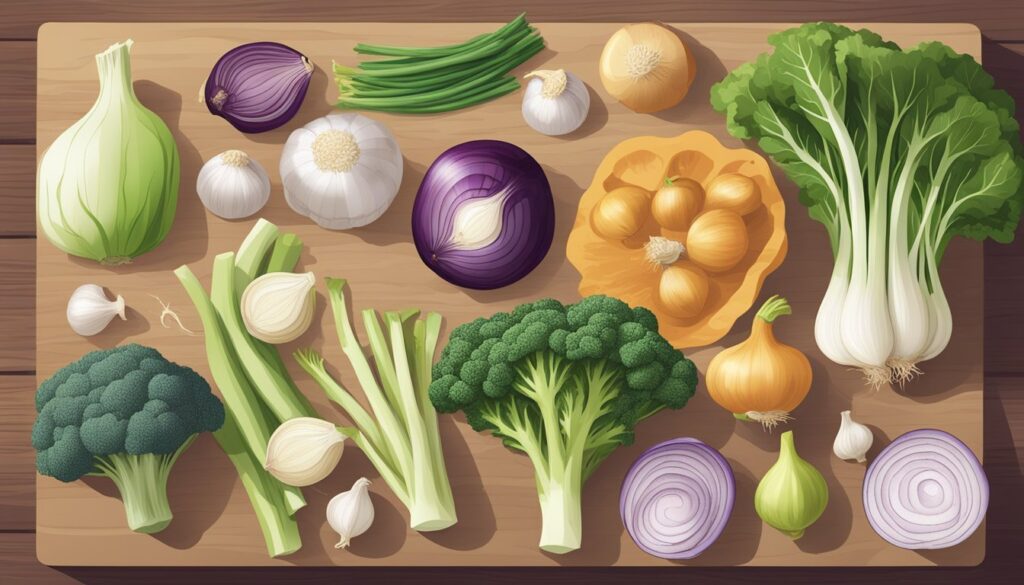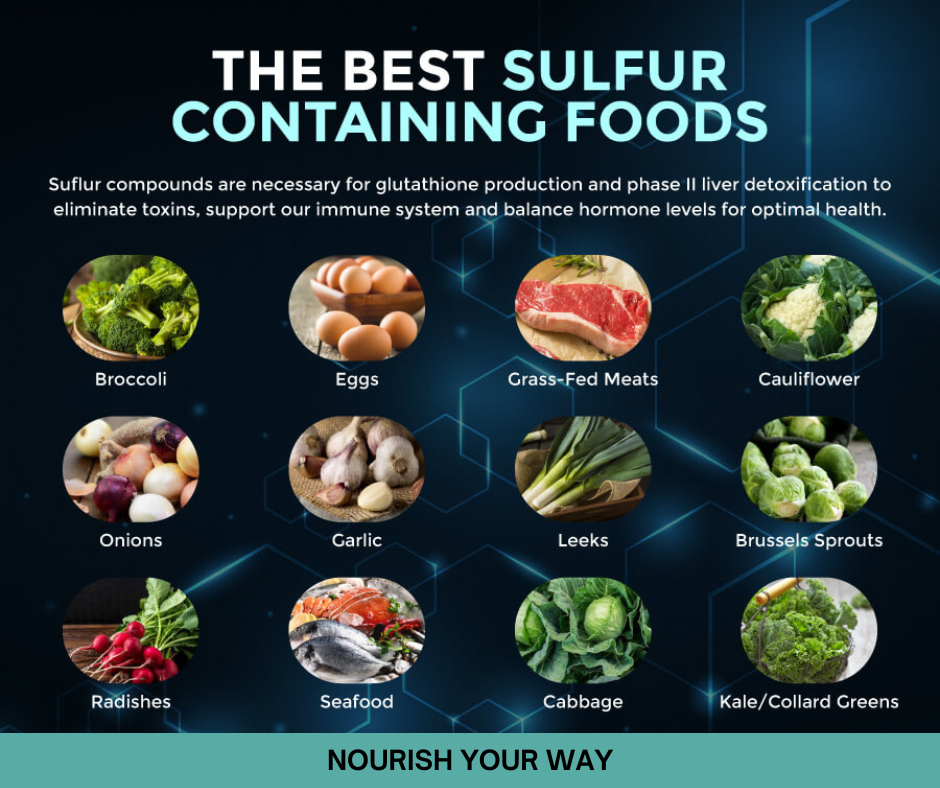
When I was diagnosed with multiple sclerosis, I learned about the importance of foods with sulfur. With Dr. Terry Wahls protocol, she suggests that MS patients eat about 3 cups of the sulfur-rich vegetables (along with 6 cups of other kinds of veggies). She says that sulfur-rich foods nourish cells and mitochondria, and specifically helps the body be more efficient in eliminating toxins. Sulfur is also important for synthesizing protein and for producing collagen, which makes up all your connective tissues. If anyone has joint issues, sulfur helps repair them. In addition, it helps construct strong bones, beautiful skin, hair, and nails.
Sulfur-rich foods are important for a variety of health reasons due to the essential role sulfur plays in the body. Here is a break down to why we should incorporate sulfur-rich foods into our diet.
- Immune Function: Sulfur has anti-inflammatory and antimicrobial properties that support the immune system. It helps in the formation of antibodies and other components crucial for immune defense.
- Joint Health: Sulfur is necessary for the production of collagen and other connective tissues. Collagen is crucial for maintaining the health and integrity of joints, tendons, and ligaments, potentially reducing the risk of joint-related issues like arthritis.
- Detoxification: Sulfur is involved in the detoxification processes in the liver. It helps in the synthesis of glutathione, a powerful antioxidant that neutralizes free radicals and helps the body eliminate toxins and heavy metals.
- Skin Health: Sulfur is often referred to as “nature’s beauty mineral” because it helps maintain the structure of skin, hair, and nails. It supports keratin production, which is crucial for strong, healthy skin and hair.
- Metabolism: Sulfur-containing compounds, such as taurine, play a role in fat digestion and nutrient absorption. They are also involved in various metabolic processes, including the regulation of blood sugar levels.
- Protein Synthesis: Sulfur is a key component of amino acids such as methionine and cysteine, which are essential for protein synthesis. Proteins are vital for muscle repair, enzyme production, and overall cellular function.
- Antioxidant Activity: Sulfur is a component of several antioxidants, including glutathione. These antioxidants protect cells from damage caused by oxidative stress, which is linked to aging and various chronic diseases.
What foods have sulfur?
Sulfur-rich foods span a variety of food groups, ensuring that you can incorporate them into your diet regardless of your dietary preferences. Here are some categories and specific examples of sulfur-rich foods:
Vegetables
1. Cruciferous Vegetables:
- Broccoli
- Cauliflower
- Brussels sprouts
- Kale
- Cabbage
- Bok choy
- Arugula
2. Allium Vegetables:
- Garlic
- Onions
- Leeks
- Chives
- Shallots
Protein Sources
1. Animal-Based:
- Eggs (especially the yolks)
- Meat (beef, pork, lamb)
- Poultry (chicken, turkey)
- Fish and seafood (salmon, mackerel, shrimp)
2. Plant-Based:
- Legumes (lentils, chickpeas, beans)
- Nuts and seeds (walnuts, sunflower seeds)
- Soy products (tofu, tempeh)
Other Sources
1. Dairy:
- Cheese (especially hard cheeses) – be careful of this one. Buy cheese from sheep’s or goat’s milk (or A2 casein) if you’re not sensitive to dairy.
- Milk and yogurt (see above)
2. Fruits:
- Avocados
- Pineapples (though lower in sulfur compared to vegetables)
Additional Notes
- Fermented Foods: Fermented foods like sauerkraut and kimchi can be particularly beneficial due to the enhanced bioavailability of sulfur compounds.
- Supplements: In some cases, supplements like MSM (methylsulfonylmethane) can be used to increase sulfur intake, but it’s generally recommended to get nutrients from food sources whenever possible.
Incorporating a variety of these sulfur-rich foods into your diet can help ensure you receive the numerous health benefits associated with sulfur.

I hope this cleared up any questions you have regarding sulfur and why we need it.
Adrienne
xo
It’s possible to reverse your MS symptoms? I can help!
Nourish Your Way to Health has may delicious sulfur-rich foods throughout.
The Path to Reverse Multiple Sclerosis

The clarity and insight you offer here have the power to change the way we see the world around us.
Every line you’ve written feels like a carefully placed step on a path that leads toward greater understanding.
What you’ve crafted here is not merely an article, an essay, or a blog post. It’s an experience. Every sentence is like a brushstroke, creating a picture that the reader gets to step into. It’s the kind of writing that leaves you feeling as though you’ve lived through something beautiful, something transformative.
This piece has a beautiful rhythm, like the gentle unfolding of a story that you don’t want to end.